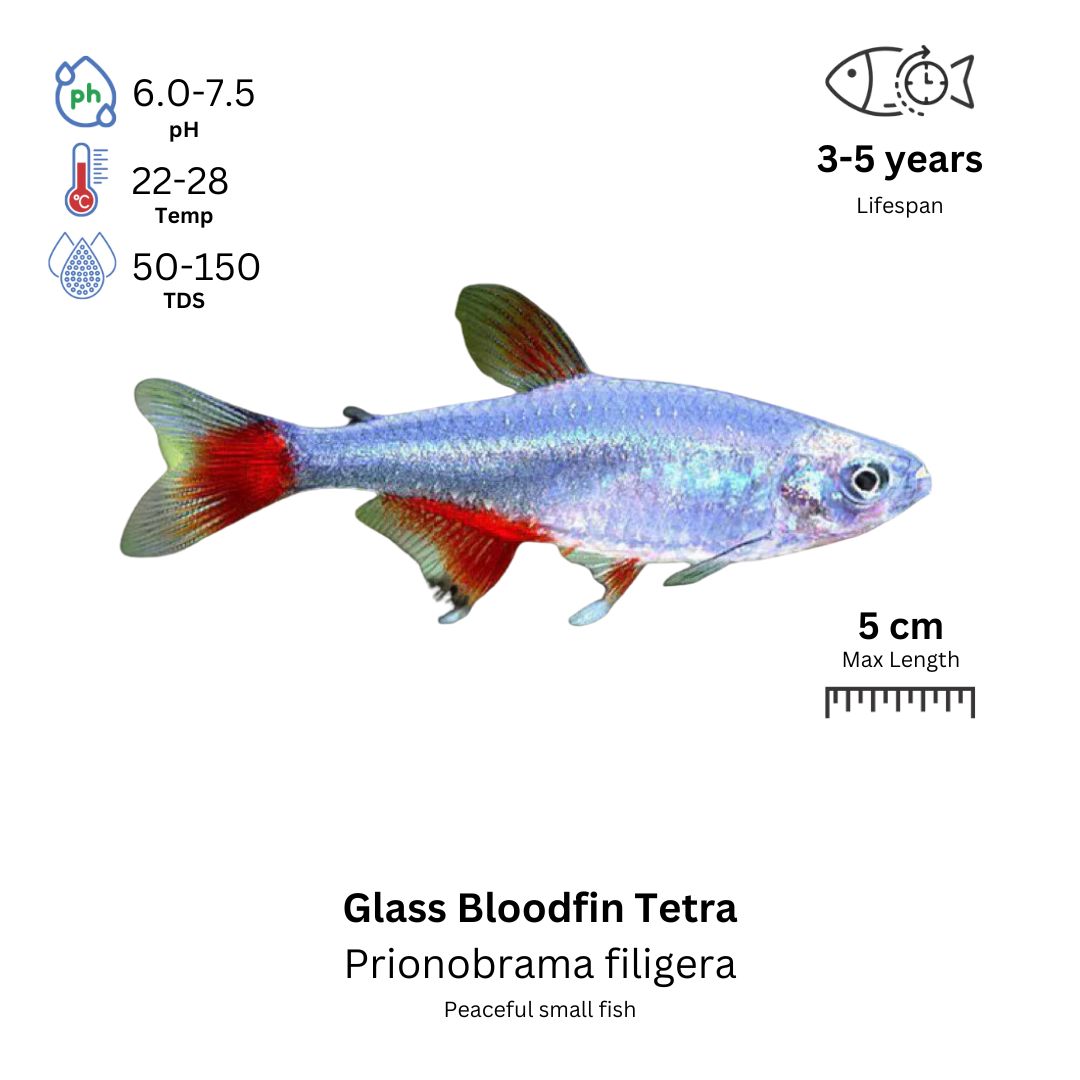Glass Bloodfin Tetra: Fish Species Profile
Species Overview
The Glass Bloodfin Tetra is a captivating freshwater fish known for its translucent body and vibrant red tail. This species is a hardy and peaceful choice for community tanks, making it a popular addition for aquarists of all experience levels.
- Common Names: Glass Bloodfin Tetra, Bloodfin Glass Tetra
- Scientific Name: Prionobrama filigera
- Adult Size: Up to 1.5 inches (4 cm)
- Life Expectancy: 5–8 years
Characteristics
- Family: Characidae
- Origin: South America (Amazon Basin, Paraguay River)
- Social: Peaceful schooling fish
- Tank Level: Mid to upper water levels
- Minimum Tank Size: 15 gallons
- Diet: Omnivore
- Breeding: Egg layer
- Care Level: Easy
- pH: 6.0–7.5
- Hardness: 5–15 dGH
- Temperature: 72–80°F (22–27°C)
Origin and Distribution
Glass Bloodfin Tetras are native to slow-moving rivers, streams, and floodplains across the Amazon Basin and Paraguay River systems in South America. They are commonly found in areas with dense vegetation and soft, acidic water.
Colors and Markings
The Glass Bloodfin Tetra has a nearly translucent body, allowing its internal organs to be faintly visible. Its defining feature is a vibrant red tail that provides a striking contrast to its clear body. This coloration makes them a unique and eye-catching choice for aquariums.
Tankmates
Glass Bloodfin Tetras are peaceful and ideal for community tanks. They thrive when housed with other small, non-aggressive species, such as:
- Neon Tetras
- Glowlight Tetras
- Rummy-Nose Tetras
- Corydoras Catfish
- Hatchetfish
- Dwarf Gouramis
Avoid pairing them with aggressive or significantly larger fish.
Habitat and Care
To create a suitable environment for Glass Bloodfin Tetras:
- Use a fine, dark substrate to mimic their natural habitat.
- Incorporate plenty of live plants, driftwood, and hiding spots.
- Maintain soft, slightly acidic water with consistent parameters.
- Provide subdued lighting to enhance their translucent body and red tail.
Regular water changes and moderate filtration will help ensure their long-term health.
Diet and Feeding
Glass Bloodfin Tetras are omnivores and thrive on a varied diet. Offer:
- High-quality flake or pellet food as a staple.
- Frozen or live foods such as brine shrimp, bloodworms, and daphnia.
- Vegetable matter like finely chopped spinach or blanched zucchini for added nutrition.
Feed small amounts 2–3 times a day, ensuring all food is consumed within a few minutes.
Gender Differences
Males are generally slimmer and more streamlined, while females have a slightly rounder belly, particularly when ready to spawn. The differences are subtle but noticeable with close observation.
Breeding
Breeding Glass Bloodfin Tetras is achievable in captivity with appropriate conditions:
- Set up a separate breeding tank with soft, slightly acidic water.
- Include fine-leaved plants or a spawning mop for egg deposition.
- Condition breeding pairs with high-quality live foods.
- Remove adults after spawning to protect the eggs.
Eggs typically hatch in 24–36 hours, and the fry become free-swimming within a few days. Start feeding fry with infusoria or powdered fry food before transitioning to baby brine shrimp.
Further Research
Explore other fish species that pair well with Glass Bloodfin Tetras, such as:
- Rummy-Nose Tetras
- Lemon Tetras
- Ember Tetras
FAQ
How many Glass Bloodfin Tetras should I keep together?
A group of at least 6–8 is recommended, as they are schooling fish and feel more secure in numbers.
Are Glass Bloodfin Tetras easy to care for?
Yes, their hardy nature makes them an excellent choice for beginners.
What makes Glass Bloodfin Tetras unique?
Their translucent body and striking red tail give them a distinctive and elegant appearance, perfect for aquariums with subdued lighting.


Reviews
There are no reviews yet.